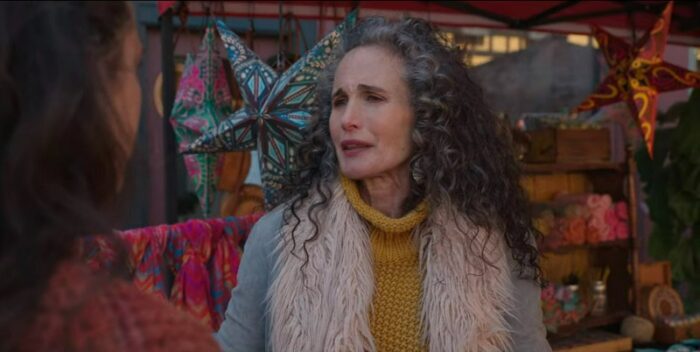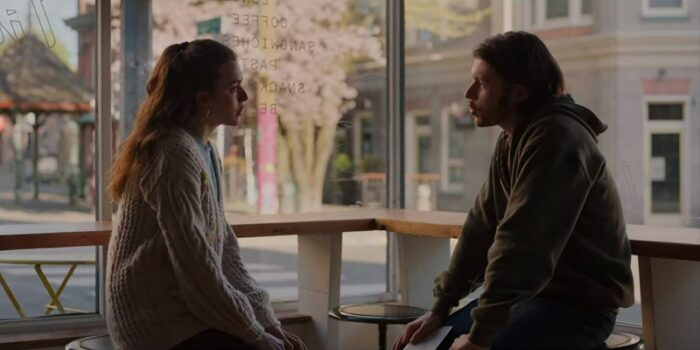The following includes spoilers for the full season of the Netflix limited series Maid.
By the conclusion of the ten-episode run of Netflix’s Maid, Alex, the limited series’ put-upon protagonist, has achieved her long-held dream of entering college. Given the abuse, gaslighting, and trauma she’s experienced, her accomplishment is well deserved, making for a fitting conclusion to her narrative. While Alex’s experience details the ways financial and emotional abuse can stunt victims’ growth and potential, her own individual path to independence and self-actualization is one that is unique to the character and no panacea for the larger societal ills the series charts. Its excellent cast, distinctive cinematography, and archetypal narrative structure all make Maid a familiar—if deeply troubling, often suspenseful, and wholly necessary—tale of empowerment.
According to Netflix, the series is on track to reach 67 million accounts in its first 28 days of release, a staggering figure that would put it ahead even of The Queen’s Gambit‘s 62 million. Like that 2020 series, Maid‘s successes are hard won through its riveting female lead performance and artful storytelling. Maid‘s story is especially timely, given the impact of the coronavirus pandemic, which the U.N. estimates could result in an increase of 420-580 million people living in poverty. Maid‘s October release coincides with the U.N. International Day for the Eradication of Poverty on October 17 and other “anti-poverty weeks” worldwide. With its wide audience, Maid has the potential to help change some hearts and open some minds to the gritty details of poverty in the U.S. and beyond.
From the series’ premiere episode, Maid‘s cast has been convincing and engaging. Nick Robinson as Sean, the father of Alex’s daughter Maddy, and Billy Burke as Alex’s father Hank both credibly portray abusive men who weaponize charm and gaslight their victims. Rylea Nevaeh Whittet as little Maddy clearly has the trust of her co-stars on camera and shines especially alongside screen mom Margaret Qualley. The excellent supporting cast—featuring Anika Noni Rose, Raymond Ablack, Tracy Vilar, Aimee Carrerro, and BJ Harrison—is more ethnically diverse than is its set of core characters.

Though Alex’s character benefits from the privileges of whiteness, youth, and beauty, and though certainly the portrayer herself has never experienced the poverty Alex has, Margaret Qualley as Alex is perfectly cast. Her wide-eyed expressions convey a silent WTFery at the absurdities of governmental support services’ labyrinthine requirements. When working, she charges at cleaning tasks with a coltish energy. In confrontations she exudes backbone, and in her writing, a quietly growing confidence. Given that she is onscreen nearly every second, Qualley’s work carries the series.
The casting of Qualley’s mother, rom-com veteran and cosmetics spokesmodel Andie MacDowell, as Alex’s mother Paula may seem on the surface something of a stunt. But the two’s interactions are a highlight of the series. Their relationship, frayed by abuse, poverty, and Paula’s mental illness, never feels faux. Qualley and MacDowell invest their interactions with a variety of emotions, from joy and relief to frustration and anger, all of them entirely believable and affecting. Qualley has earned most of the acclaim for the series and shoulders most of the screen time as its titular protagonist, but MacDowell is given more to do here than she has in some time, and Maid is all the better for creating a wide canvas for her Paula.

The camerawork shared by Quyen Tran, Guy Godfree, and Vincent De Paula glistens in the damp forests of the Pacific Northwest, glides through the tony residences on its fictional Fisher Island, and patiently inventories the hoarded messes of Alex’s patrons’ lower-class patrons. The series never strays from Alex’s perspective and frequently departs from objective reality to chart her subjective reaction to the events around her. When Alex listens to custody lawyers and judges drone on in legalese, we hear what she hears: “She’s legally legal, we ask the court to legal legal legal.” When she reads government forms, the imagined headlines torment her: “Welfare Bitch, Nobody Cares, Go F*ck Yourself.” When she begins to recover memories of her own childhood abuse, she flashes back to her hiding fearfully in the kitchen cupboards, just as Maddy had on the night they first escaped Sean. The series keeps Alex’s fright, flight, and eventual fight front and center.
In fact, the way the narrative hews so closely to Alex and her story helps viewers to understand her plight fully, from her initial flight from Sean’s house to her hard-won enrollment at the University of Montana. That making a living wage either working for a service like Yolanda’s Value Maids or striking out on one’s own is nearly impossible. That managing the layers of bureaucracies associated with any government assistance is time-consuming and frustrating. That using vouchers to purchase even the most basic necessities invites the scorn of less-unfortunate shoppers. And, most importantly, that daring to leave a household, even for fear of your own and your daughter’s personal safety, is an action that will be questioned by everyone from the courts to your own parents.
While Maid excels at telling Alex’s story, we’re given less information to understand her father Hank’s abuse, Paula’s mental illness, or Sean’s alcoholism—but each of those, is, ultimately, something Alex witnesses, is impacted by, but cannot resolve. In fact, all three—Hank, Paula, and Sean—engage in different forms of gaslighting. Gaslighters often shade truth in part to evade accountability. Hank refuses to acknowledge or engage Alex as she works to recover her childhood memory of his abuse of both her and Paula. Paula’s is less intentional, but she drones on about her beloved “Sean-y” while ignoring the reality of his abuse of Alex. Sean becomes not only an emotional but also a financial abuser, holding Alex and Maddy hostage and penniless in his trailer house, without any means of communicating with the outside world. Her psychological entrapment there is truly terrifying. Even Alex’s supposed friends question her value and self-worth.
In adapting Stephanie Land’s memoir as freely as she does—changing names, inventing situations, expanding the story and locales—Molly Smith Metzler focuses less on the content of the New York Times bestseller Maid: Hard Work, Low Pay, and a Mother’s Will to Survive and more on a broader, more recognizable, and more palatable story of a charismatic protagonist’s challenge, one that follows the well-worn structure of the hero’s journey. Alex begins the series by leaving home, struggles to cope in a new setting, encounters others who mentor and challenge her, and falls into an abyss. She is in the belly of the figurative beast when entrapped once again in Sean’s house, without resources, work, or friends. Ultimately, she benefits from others, particularly former client Regina, using her newfound understanding of family law and her writing talent to prevail over her adversity.
Metzler’s series, then, focuses largely on fleshing out Alex’s character and others’ while using the raw material of Land’s memoir as the work Alex is writing. Since Land’s experience was largely an isolated one—her mother and father were unnamed and hardly present in the memoir, save for the opening anecdote—Metzler creates a more fully fleshed out fictional world of continuing characters with whom Alex interacts. Alex’s friendship with and help from moneyed client Regina, potential suitor-savior Nate’s persistence, Sean’s struggle with alcoholism, Paula’s ongoing mental-heath and relationship issues are all of Metzler’s creation.

This approach makes for a clever way of staying faithful to the spirit of the source material while not having to hew exactly to its details. For instance, in Land’s memoir she details having cleaned the boyhood home of the notorious “Barefoot Bandit,” a teen who committed over 100 thefts in the Pacific Northwest in the late aughts; in Maid‘s Episode 5, however, she not only feels a kinship for the folk hero, but a brief moment of entrapment in a dark crawlspace triggers her claustrophobia, which leads to her recovering her own childhood memory of hiding from her father Hank’s explosive anger.
Other episodes’ invented material, like the birthday party in Episode 6, “M,” is simultaneously touching and troubling. The subplot involving Paula’s boyfriend Basil’s embezzlement of the equity in her house shows how precarious some women’s financials can be—and how easily a gaslighter can take advantage of their situation, just like Sean does when a homeless, jobless Alex moves back in with him, feeling she has no other option. Unlike some adaptations expanded and stretched to fit the teleseries format, in Maid each invention has a clear narrative purpose.
Through each of the episodes, though, the content of Land’s book remains. It’s not the story the narrative of the series Maid tells, but it’s the content that Alex composes, first in her composition book, then in an online blog, and finally for her application to the University of Montana. The campus town Missoula, with its hiking and kayaking, becomes a mecca for Alex. Personally, that she finds in English Department a place where she can nurture her love of literature and writing is something I find profoundly affecting, especially given the short shrift liberal arts find in the college-as-vocational-prep rhetoric so commonplace today.
For Alex, going to college and enrolling in a creative writing program is a major triumph. And for generations, higher education has been one path to economic security. The series demonstrates clearly that Alex is intelligent and driven enough to succeed in her studies. She’s already proved that she can write even when her work duties and personal commitments complicate her life. But Maid is more than the story of a single, individual, unique protagonist: it’s the story of generations of women who, without adequate financial foundations, toil in dependency to others, shoulder the burden of domestic work, and suffer abuse without escape. The shelters and programs for victims of that abuse do much to right the course for those who find them but hardly address their root causes.
Though Alex’s story makes perfect narrative sense, is based on Stephanie Land’s own experience, and earns its success in part through the work of a sisterhood of friends, mentors, and lawyers committed to her eventual escape, Maid doesn’t much address the root cause of Alex’s initial dilemma. That men like Sean and her father Hank can perpetuate cycles of domestic violence without acknowledging or working to correct it. That women like Paula can enable that violence even while suffering from it. That society more broadly can ignore the plight of the working poor so blithely. All of these conditions remain present even if Maid‘s Alex is poised on the cusp of escape and empowerment at the series’ end.
As Metzler has noted, most people in Alex’s position probably wouldn’t make it out of the conditions she faces in Episode 8, where she has glumly surrendered to her abusive, isolated experience in Sean’s house. The character’s whiteness, privilege, and charisma earn her a chance to flee her surroundings that ultimately pays off in her freedom. But according to U.S. Census Bureau data the experience of extreme poverty tends to fall disproportionately on black, indigenous and people of color. So too does that of intimate partner violence, according to the Office for Victims of Crime. Alex is not the face most typical of a victim of domestic violence and extreme poverty in the U.S., but she makes for a compelling character nonetheless.
And Alex is, after all, a character based in the truth of author Stephanie Land’s experience. Metzler’s approach to adapting Land’s memoir is clever and effective, essentially staying faithful to the episodes Land composed while fleshing out the protagonist’s story with invented or expanded characters and narratives. It may not be the narrative that speaks to people of color, as they are relegated here to the periphery, as Alex’s employers and helpers. But with its roots in Land’s lived experience it is her truth and others’ that is told.
Maid was developed as a limited series, focusing exclusively on adapting Land’s memoir though ten episodes. There are reportedly no plans to continue with Alex’s story or these characters in a subsequent season, but conceptually, Maid has an important story to tell, one that need not be limited to Land’s book or experience nor to this particular set of characters and their portrayers. One approach might be for Maid to begin anew its second and subsequent seasons with entirely different characters in the industry. Even sharp-tongued, brittle-backed Yolanda has a story to tell! But one thing is for certain: while Maid’s protagonist is unique, her dilemma—facing extreme poverty while working a untenable conditions and caring for family—is not. There are thousands of maids with stories worth telling.

